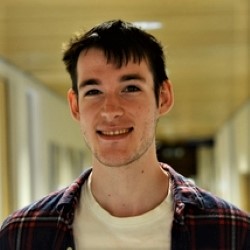Submitted by Rachel Gardner on Wed, 24/05/2023 - 16:10
Many congratulations to Research Fellow Conrad Watt whose PhD dissertation today received an Honourable Mention for the 2022 ACM Doctoral Dissertation Award.
The Honourable Mention Award, accompanied by a prize of $10,000, was given to Conrad by the Association for Computing Machinery — the world’s largest association of computing professionals.
He received it for his dissertation on 'Mechanising and evolving the formal semantics of WebAssembly: the Web’s new low-level language'.
His dissertation is considered a stand-out example of developing and using fully rigorous mechanized semantics to directly affect and improve the designs of major pieces of our industrial computational infrastructure.
ACM
ACM, the Association for Computing Machinery is the world’s largest educational and scientific computing society, uniting computing educators, researchers and professionals to inspire dialogue, share resources and address the field’s challenges.
 In its citation, the ACM said that Conrad's dissertation "establishes a mechanized semantics for WebAssembly and defines its concurrency model. The model will underpin current and future web engineering. His dissertation is considered a stand-out example of developing and using fully rigorous mechanized semantics to directly affect and improve the designs of major pieces of our industrial computational infrastructure."
In its citation, the ACM said that Conrad's dissertation "establishes a mechanized semantics for WebAssembly and defines its concurrency model. The model will underpin current and future web engineering. His dissertation is considered a stand-out example of developing and using fully rigorous mechanized semantics to directly affect and improve the designs of major pieces of our industrial computational infrastructure."
Conrad is Research Fellow here, focusing on mechanised formal verification, concurrency, and the WebAssembly language. He received an MEng in Computer Science from Imperial College London before completing his PhD here in 2021 under the supervision of Professor Peter Sewell.
Also receiving an Honourable Mention Award today was Alane Suhr for his doctoral dissertation (at Cornell University) on 'Reasoning and Learning in Interactive Natural Language Systems'. Aayush Jain received the 2022 ACM Doctoral Dissertation Award for his dissertation 'Indistinguishability Obfuscation from Well-Studied Assumptions', which established the feasibility of mathematically rigorous software obfuscation from well-studied hardness conjectures.
EAPLS Best Dissertation Award
Today's Honourable Mention Award is the second prize Conrad has received for his PhD dissertation, which also won the Best Dissertation Award 2021 from EAPLS, the European Association on Programming Languages and Systems.
Every year the EAPLS presents an award to the PhD student they judge to have made the most original and influential contribution to the area of Programming Languages and Systems, and who has graduated from a European academic institute.
Conrad was selected as winner by a committee of international experts who judged candidates' theses on their originality, significance, and quality of writing. They concluded that Conrad's dissertation was an outstanding piece of work and considered it the best amongst some very strong contenders.
Conrad's dissertation discusses WebAssembly, the first new programming language to be supported natively by all major Web browsers since JavaScript. It describes a number of ways in which Conrad both helped to shape the specification of WebAssembly, and built upon it.
By mechanising the WebAssembly formal semantics in Isabelle/HOL while it was being drafted, he discovered a number of errors in the specification, drove the adoption of official corrections, and provided the first type soundness proof for the corrected language.
In their findings, the jury said that Conrad's work "has placed WebAssembly on a secure footing, which is essential for what is becoming a key Internet technology."
They added that his research contributions and industrial impact were outstanding and that several flaws he identified in the language specification have now been corrected by the standards body. Moreover, they noted that the efforts he made on collaborating with various researchers and industry experts, providing understanding and knowledge, is commendable.
EAPLS concluded by saying "We offer Conrad our heartfelt congratulations on his achievement. We are confident that it will be a sign of a long and distinguished scientific career."

